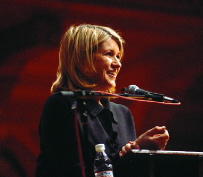 |
| Displaying humor and an insatiable curiousity about the world, Martha Stewart charmed a Sanders Theatre audience. |
| Photograph by Jim Harrison |
More good things followed. The audience learned of Stewart's progress from Barnard undergraduate to Wall Street stockbroker to caterer, book author, and CEO of an omnimedia empire that includes the Martha Stewart Living television show and magazine (10 million readers), a syndicated newspaper column, a mail-order catalog, and much more. Stewart is a woman of voracious appetites and extraordinary curiosity. She belongs, for example, to the France-based Marron Society, for those who keep a rare breed of hen that lays mahogany-colored eggs. (She also has three dogs, eight cats, 18 canaries--and several houses: "I buy houses the way other people buy shoes," she confessed. "To me, they're laboratories.") If she could repeat college, she'd do it in Cambridge--at MIT. "I love astronomy and space, black holes," she explains.
"I'm driven by subject matter--I'm really interested in a lot of things," she says. "I go to Maine and I want to know all about the outdoors. I love to travel--it gives me so many ideas. Work is a feast for me; I can call up people like Daniel Boulud, who has the four-star Restaurant Daniel in New York, ask him to come on the show, and learn from him."
"Homemaking had never been treated as a business in America," she said in her lecture. "With my team, I've created an industry." Stewart's company ("I don't know why you'd want to be a CEO--I am one") builds on eight "core content" areas--holidays, crafts, gardening, cooking and entertaining, home, weddings, "keeping," and the source of them all, "baby." With slides, she described her visual themes, one of which is hands: "Hands are what make everything possible."
Her efforts to create "evergreen material, things of everlasting value" originate in exacting research. "We're very strict in determining where we get our information," she says. Intuition also plays a big role. "I can sense a void in the culture," says Stewart. The company bases "everything we do on the way I feel about things. I don't consider myself either above or below our readers. Something I need will also connect with what many others feel and care about at the same time. The quest is to produce things that are kind of 'missing' from life. People are trying to master small things in areas they know about."




